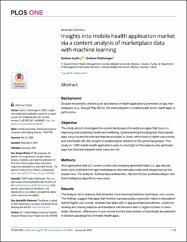| dc.contributor.author | Aydın, Gökhan | |
| dc.contributor.author | Silahtaroğlu, Gökhan | |
| dc.date.accessioned | 2021-01-29T06:59:57Z | |
| dc.date.available | 2021-01-29T06:59:57Z | |
| dc.date.issued | 2021 | en_US |
| dc.identifier.citation | Aydın, G. ve Silahtaroğlu, G. (2021). Insights into mobile health application market via a content analysis of marketplace data with machine learning. PLOS One, 16(1). https://dx.doi.org/10.1371/journal.pone.0244302 | en_US |
| dc.identifier.issn | 1932-6203 | |
| dc.identifier.uri | https://dx.doi.org/10.1371/journal.pone.0244302 | |
| dc.identifier.uri | https://hdl.handle.net/20.500.12511/6445 | |
| dc.description.abstract | Background Despite the benefits offered by an abundance of health applications promoted on app marketplaces (e.g., Google Play Store), the wide adoption of mobile health and e-health apps is yet to come. Objective This study aims to investigate the current landscape of smartphone apps that focus on improving and sustaining health and wellbeing. Understanding the categories that popular apps focus on and the relevant features provided to users, which lead to higher user scores and downloads will offer insights to enable higher adoption in the general populace. This study on 1,000 mobile health applications aims to shed light on the reasons why particular apps are liked and adopted while many are not. Methods User-generated data (i.e. review scores) and company-generated data (i.e. app descriptions) were collected from app marketplaces and manually coded and categorized by two researchers. For analysis, Artificial Neural Networks, Random Forest and Naïve Bayes Artificial Intelligence algorithms were used. Results The analysis led to features that attracted more download behavior and higher user scores. The findings suggest that apps that mention a privacy policy or provide videos in description lead to higher user scores, whereas free apps with in-app purchase possibilities, social networking and sharing features and feedback mechanisms lead to higher number of downloads. Moreover, differences in user scores and the total number of downloads are detected in distinct subcategories of mobile health apps. Conclusion This study contributes to the current knowledge of m-health application use by reviewing mobile health applications using content analysis and machine learning algorithms. The content analysis adds significant value by providing classification, keywords and factors that influence download behavior and user scores in a m-health context. | en_US |
| dc.language.iso | eng | en_US |
| dc.publisher | Public Library of Science | en_US |
| dc.rights | info:eu-repo/semantics/openAccess | en_US |
| dc.rights | Attribution 4.0 International | * |
| dc.rights.uri | https://creativecommons.org/licenses/by/4.0/ | * |
| dc.subject | Mobile Health Application | en_US |
| dc.subject | Content Analysis | en_US |
| dc.subject | Marketplace Data | en_US |
| dc.title | Insights into mobile health application market via a content analysis of marketplace data with machine learning | en_US |
| dc.type | article | en_US |
| dc.relation.ispartof | PLOS One | en_US |
| dc.department | İstanbul Medipol Üniversitesi, İşletme ve Yönetim Bilimleri Fakültesi, Yönetim Bilişim Sistemleri Bölümü | en_US |
| dc.department | İstanbul Medipol Üniversitesi, Sağlık Bilimleri Fakültesi, Sağlık Yönetimi Bölümü | en_US |
| dc.authorid | 0000-0002-5652-8694 | en_US |
| dc.authorid | 0000-0001-8863-8348 | en_US |
| dc.identifier.volume | 16 | en_US |
| dc.identifier.issue | 1 | en_US |
| dc.relation.publicationcategory | Makale - Uluslararası Hakemli Dergi - Kurum Öğretim Elemanı | en_US |
| dc.identifier.doi | 10.1371/journal.pone.0244302 | en_US |
| dc.identifier.wosquality | Q2 | en_US |
| dc.identifier.scopusquality | Q1 | en_US |



















